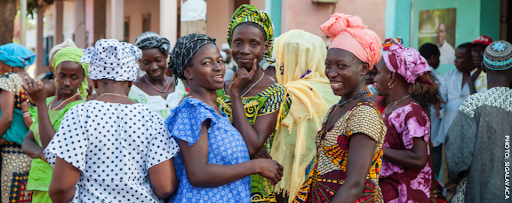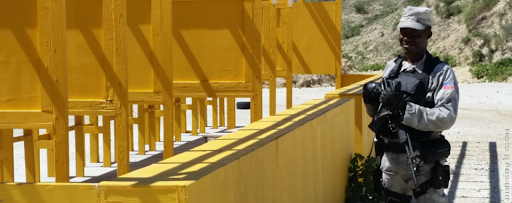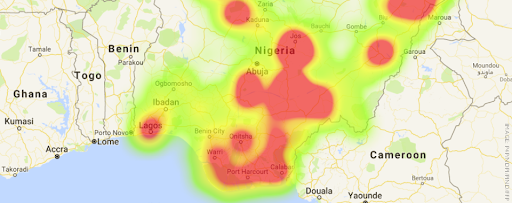Capabilities
Conflict Prevention
 FFP works with partners at the local, national and international levels to develop mechanisms for timely and effective conflict early warning and preventative response. Using robust data-driven methodologies and innovative technology coupled with local-level knowledge, we help civil society, government and private sector actors better understand and respond to conflict incidents and trends before they escalate. FFP worked with partners on the USAID REWARD program to conduct Country Risk and Vulnerability Assessments in each of the 15 ECOWAS member states. Drawing on data analytics, GIS, and over a thousand interviews with local stakeholders in all the hotspots across West Africa, these reports inform ECOWAS's strategy for promoting resilience in the face of economic, environmental, and security challenges. Watch a 10 minute video about the project here.
FFP works with partners at the local, national and international levels to develop mechanisms for timely and effective conflict early warning and preventative response. Using robust data-driven methodologies and innovative technology coupled with local-level knowledge, we help civil society, government and private sector actors better understand and respond to conflict incidents and trends before they escalate. FFP worked with partners on the USAID REWARD program to conduct Country Risk and Vulnerability Assessments in each of the 15 ECOWAS member states. Drawing on data analytics, GIS, and over a thousand interviews with local stakeholders in all the hotspots across West Africa, these reports inform ECOWAS's strategy for promoting resilience in the face of economic, environmental, and security challenges. Watch a 10 minute video about the project here.
Human Rights and Business

- Security Assessments and Guidance
FFP provides risk and security assessments to companies around the world, primarily in the oil, gas and mining sectors, who are seeking to implement the Voluntary Principles on Security and Human Rights or simply improve relationships with local communities. We support companies in their development of Human Rights & Security Polices, Conflict and Human Rights Assessments, Community Relations and Stakeholder Engagement, Monitoring and Reporting Mechanisms, and Training. We have also worked with multilateral investors and companies in the extractives industry to develop trainings and guidance to better integrate human rights into their daily operations and security arrangements. - Capacity Building and Training
At the heart of FFP's approach to promoting sustainable security is partnership with local stakeholders. Through our programs, we aim to build the capacity of our partners and promote the long-term sustainability of their programming. We also provide training on conflict early warning and response, state fragility, human rights, security and other topics to a wide range of academic, government, NGO, security and private sector actors. - Multi-stakeholder Initiatives
For more than 20 years, FFP has hosted the Human Rights and Business Roundtable, a ground-breaking forum for businesses and civil society to discuss issues of common concern in an atmosphere of mutual trust, respect and confidentiality. FFP also continues to be a leading member of the Voluntary Principles Initiative and conducts frequent multi-stakeholder roundtables as part of VPs implementation in Ghana and other locations around the world.
Data Analytics

- Fragile States Index
The Fragile States Index (FSI) produced by The Fund for Peace (FFP), is a critical tool in highlighting not only the normal pressures that all states experience, but also in identifying when those pressures are outweighing a states' capacity to manage those pressures. By highlighting pertinent vulnerabilities which contribute to the risk of state fragility, the Index - and the social science framework and the data analysis tools upon which it is built - makes political risk assessment and early warning of conflict accessible to policy-makers and the public at large. The strength of the FSI is its ability to distill millions of pieces of information about the existing social, economic, and political pressures faced by each of the 178 countries on the index. - Contextual Risk Tools
Contextual risk refers to events, factors or dynamics occurring in the broader environment which affect programming or operations but are beyond the control of organizations or individuals. FFP conducts research and develops practical tools for stakeholders across government, civil society, academia, and the private sector to better understand their operating environment and assess the pressures and risks facing a country. We believe that giving stakeholders (particularly those working in fragile and conflict-affected environments) a greater holistic understanding of context ultimately leads to smarter, more successful, and more sustainable programming and interventions. - Data for Peace
FFP uses varied technological approaches for peacebuilding, including Content Analysis, GIS mapping, Stakeholder Network Analysis, Statistical Trend Analysis, Quantitative Indexes, Mixed Methods Research, and Impact Assessments. More specifically, FFP specializes in conflict mapping and geospatial data analysis and has used this expertise to support several projects. FFP built an online Peace Map that integrates more than 24,000 conflict incidents in Nigeria and lists more than 650 Peace Agents. The Peace Map aims to strengthen local participatory conflict assessment and has allowed FFP's local partners to address various conflict issues in the Niger Delta. The creation of the Peace Map has allowed FFP to produce studies, briefs, and trackers on conflict trends in the Niger Delta, helping to fill in knowledge gaps on the part of the donor community and public-sector stakeholders.
Commercial Use of Data General Use of Data
The Fund for Peace | 609 G Street SW | Washington, D.C. 20024 | (202)709-8227
Copyright (c) 2022 - The Fund for Peace
Log In
The Fund for Peace | 609 G Street SW | Washington, D.C. 20024 | (202)709-8227
Copyright (c) 2022 - The Fund for Peace
Log In
